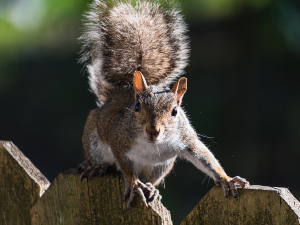
Squirrels may be cute, but they are wild animals first and foremost. These tiny creatures usually shy away from humans, and this may be for the best.
Squirrels have long, sharp teeth and claws; getting scratched by this animal won’t end well for you. But what exactly are the risks of a squirrel scratching you? This article explores the question of ‘What happens if a squirrel scratches you’
If a squirrel scratches you, it can leave you with a very deep and painful cut. A squirrel’s long, strong, and sharp teeth and claws can easily cut into you. In addition, the animal can be carrying a disease that can be transmitted to you through a scratch
Table of Contents
What happens if a squirrel scratches you?
Squirrels have not been raised to socialize with humans. Close contact, such as trying to pet or feed it, can cause the animal to become stressed, which can lead to them becoming aggressive and scratching or biting you.
There are a couple of things you need to worry about when these animals scratch you, namely:
Wounds:
When a squirrel feels threatened, it will get aggressive and scratch or bite you. Feeling threatened triggers their fight-or-flight instinct.
Squirrel teeth can dig into human skin quite easily. Scratches from squirrel nails can tear into your skin, causing it to bleed profusely.
In addition, sites of scratches or bites can become a bacterial hotbed and cause a bacterial infection. If you’re bitten or scratched by a squirrel, it is always a good idea to have it looked at by a healthcare professional
Rabies infection:
There are various diseases that a person can catch when scratched or bitten by a squirrel. Diseases can be transferred through the saliva of an infected animal. Thus, a bite from a squirrel can result in an infection.
Thankfully, squirrels rarely carry rabies. That being said, it is still important that you have yourself checked out by a doctor as soon as you can after receiving a squirrel bite, just to make sure.
If the squirrel had been showing signs of having rabies, such as aggressive behaviour prior to biting you, was seeking you out, or was foaming at the mouth at the time of biting you, you must get yourself to a doctor or a hospital as soon as possible.
Other diseases:
Squirrel bites or scratches can be a vehicle for other diseases. Squirrels can also transmit tularemia, salmonellosis, leptospirosis, and Lyme disease. More information on these diseases will be explained later in the article
What diseases can you get from squirrels?
Leptospirosis: If the animal scratches you, and its urine comes into contact with your open wound, the disease can be transmitted to you. Signs of this disease can include rashes, fever, vomiting, and headaches
Lyme disease: Squirrels, just as any other animal, can also suffer from being hosts to ticks that carry bacteria. Signs of Lyme disease in humans include a skin rash, fatigue, and headaches
Salmonellosis: The Salmonella bacteria can be present in uncooked eggs as well as squirrel faeces. Signs that you are suffering from this illness include vomiting, diarrhoea, and intestinal cramps
Tularemia: If you handle a sick or dead squirrel without protecting yourself by wearing gloves and other protective gear, you can catch this disease. Signs of this disease in humans include fever, headaches, swollen lymph glands, and skin ulcers.
FAQ:
How to tell if a squirrel is carrying a disease?
There are many tell-tale signs that will let you know that a squirrel has a disease.
These include discharge coming from the nose or mouth, sneezing, wheezing, shivering, lethargy, drooling, hair loss, scabbing, dragging legs, laboured breathing, bleeding from the nose, ears, and eyes, and neurological signs
Can a squirrel be a pet?
These animals may be very cute and adorable, but they are not appropriate animals to keep as pets. There are many reasons why these animals shouldn’t be kept as pets
The reasons why they shouldn’t be kept as pets include the fact that their sharp nails are a danger to humans, they require a lot of activity time which is a lot of commitment, they chew on everything, wild squirrels don’t have control on how hard they bite, and, overall, they are a wild animal that would not be happy to be kept in captivity
Is it safe to touch squirrels?
Touching squirrels may seem like a harmless act, but the situation can turn dangerous quickly. Because of this, touching squirrels is not recommended.
Because these animals are easily frightened and agitated, they can scratch you in self-defence if you’re getting too close.
In addition, bacteria, urine, or faeces may be hiding in the squirrel’s fur, so it’s best to keep your hands to yourself around squirrels.
Conclusion
In conclusion, if a squirrel scratches you, there is a chance (albeit small) that you may catch a disease like rabies as a result of the scratch.
In addition, the animals’ long, sharp nails can cut into your skin easily, causing much pain.
Other diseases that squirrels can give you include tularemia, salmonellosis, leptospirosis, and Lyme disease. So, regardless of the situation, it is probably best not to touch a squirrel
If you enjoyed this article then you may also be interested in other squirrel related articles. Here are some articles that you may be interested in: How much do baby squirrels sleep?, Why do squirrels like nuts?, What fruit do squirrels eat?

